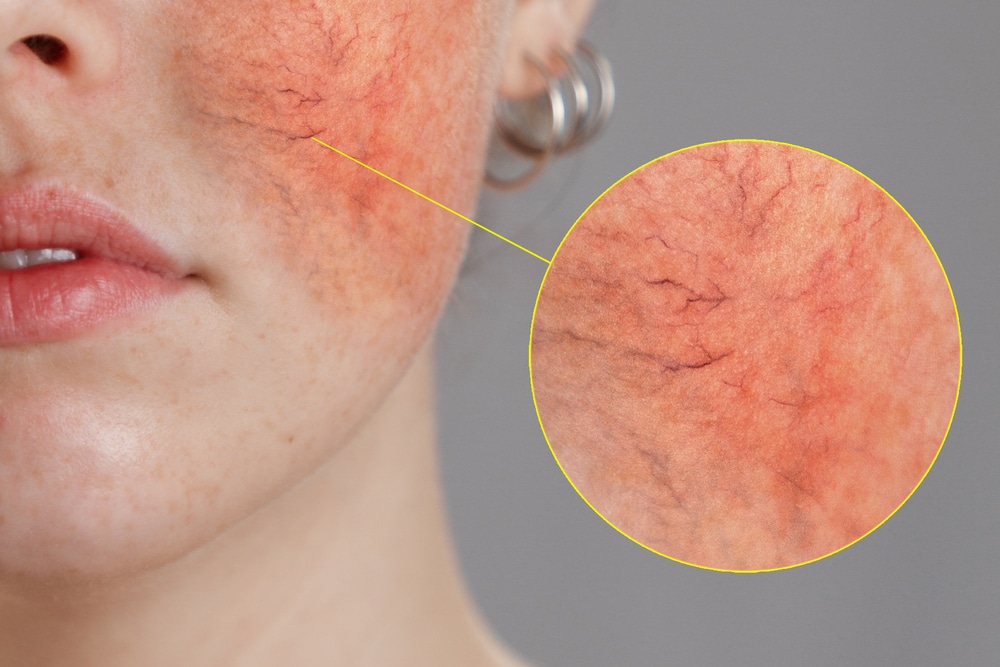If you live with rosacea, a skin condition characterized by flushing, visible blood vessels in the face, and the presence of pus-filled bumps, you are well aware of the discomfort it can cause. Left untreated, rosacea can worsen over time and may even increase the risk of developing other health conditions including diabetes, heart disease, Alzheimer’s disease, and more. In many cases, the condition can also have a negative impact on self-confidence and mental health.
At Dermatology Institute and Laser Center, Dr. Ros and our world-class team work closely with rosacea patients to provide effective symptom relief. Though there is no cure for the condition, it can be managed with treatments ranging from topical or oral medications to laser treatments and lifestyle changes.
Over the past two decades, a body of research has emerged exploring the link between a bacteria known as H. pylori and rosacea. In many cases, treating H. pylori can be an important first step in effectively managing rosacea symptoms. In this post, we’ve taken a closer look at the relationship between H. pylori and rosacea as well as what it might mean in terms of your treatment options.
To learn more about our innovative approach to rosacea treatment at Dermatology Institute and Laser Center, contact our clinic today to book your initial consultation!
Helicobacter Pylori Or H. Pylori
Helicobacter pylori, commonly referred to as just H. pylori, are a type of bacteria found in the stomach and gut of approximately two-thirds of the global population and about 50% of Americans. Though H. pylori bacteria cause stomach infection, it is often asymptomatic and the majority of people who have them may not even realize their presence in their body. When symptoms associated with H. pylori do occur, they can include:
- Nausea
- Frequent burping
- Bloating
- Loss of appetite and weight loss
- Burning in the stomach
- pylori can also lead to peptic ulcers and is associated with stomach cancer. Commonly contracted in childhood, it can pass into the body through contaminated food/water or be passed from person to person through contact with saliva or other bodily fluids. The presence of H. pylori infection is usually confirmed with stool testing.
Rosacea
Acne rosacea, commonly referred to as simply rosacea, is a common skin condition associated with redness/flushing, small bumps, and thickened skin on the face. Its exact cause is unknown, but the condition is thought to stem from a combination of genetic and environmental factors. Rosacea can be exacerbated by triggers that increase blood flow to the face. For many patients with rosacea, these triggers include:
- Hot or spicy food
- Anger or embarrassment
- Sun exposure
- Alcohol and/or caffeine
- Strenuous exercise
- Certain medications
The Link Between The Two
A facial skin condition and bacteria found in the digestive tract may seem to have little connection to one another, but research has shown that there is, indeed, a relationship between H. pylori and rosacea. In fact, the link between them is twofold:
- H. pylori infection is associated with blood vessel dilation which, in turn, can trigger the redness and visible blood vessels characteristic of rosacea.
- When H. pylori bacteria stimulate the immune system, they trigger the production of infection-fighting proteins and molecules known as inflammatory mediators, which can trigger an inflammatory response and contribute to rosacea symptoms.
Research Methods Conducted
Over the past two decades, a wide range of studies have explored the link between H. pylori and rosacea, each with its own unique methodology, location, and cohort of patients. A systematic review published in 2018 looked at 27 research studies conducted between 2008 and 2018 to synthesize more information about the correlation between the conditions.
Results Of The Study
The research review concluded that epidemiological investigations and experiments have both confirmed that H. pylori and rosacea are correlated with one another. People with rosacea have been shown to have much higher rates of H. pylori infection than the general population and H. pylori treatment has been shown to have excellent outcomes for many rosacea patients.
Treating H. Pylori
- pylori are frequently treated with antibiotic therapy, but medications such as proton pump inhibitors and histamine (H-2) blockers may also be prescribed to help reduce the amount of acid in the stomach. Your doctor will work with you to determine the treatment approach that will be most effective based on your particular symptoms, needs, and health goals.
Treating Rosacea
If H. pylori bacteria are present in your digestive tract, treating the associated infection may be a recommended first step in managing rosacea symptoms and minimizing flare-ups. Once H. pylori is under control, other rosacea treatments may include topical or oral medications, laser treatments, and/or lifestyle changes to help reduce exposure to rosacea triggers.
If you are seeking rosacea treatment in New Jersey, our exceptional team of Rockaway in dermatologists at Dermatology Institute and Laser Center are ready to help. Contact us today to learn more about the connection between rosacea and Helicobacter pylori infection and book an appointment. We look forward to working with you!



